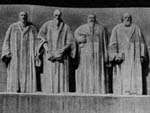Protestantism in Switzerland
Home > Tourist Guide > Table of contents > Swiss culture > Religions > Protestantism
Switzerland holds an important place in the history of Protestantism. Zwingli and Calvin largely contributed to the international religious influence of their homeland. | Reformation Monument | 
©_Micheloud_&_Cie |
|
In Geneva’s Bastions Park, across from the University, the "Reformation Monument" was erected to commemorate Calvin’s 400th birthday. The central group represents (from left to right) Guillaume Farel, John Calvin, Théodore de Bèze and John Knox. On the sides of the monument, two steles recall the pioneers of the Reformation: Martin Luther and Ulrich Zwingli. |
|
Loss of preponderance
A longtime majority (nearly 60%), the Protestant churches and communities did not benefit from the predominantly Catholic immigration in 1960-1970. The proportion of Protestants thus experienced a strong depreciation, comprising only 40% of the population in 1990. Only 140,000 Protestants are of foreign nationality (3.2%).
There is a significantly higher proportion of elderly people amongst the Protestants as opposed to the Catholics. Cantonal distribution
 Bern is the only canton that has retained a strong Protestant majority (72.2%). Then follow the cantons of Glarus, Thurgau, Vaud, Neuchâtel, Zurich, Basle-Country, Schaffhouse and Appenzell Outer-Rhodes, where the Protestant majority stands at round about 50%, while the Catholics represent only about a third of the population. The cantons of St Gallen, Graubünden, Geneva, Aargau and Solothurn reveal a dual denomination tendency with a relative majority of Roman Catholics. Finally, Basle-City represents an atypical case, since no one religion groups together over a third of the population. Bern is the only canton that has retained a strong Protestant majority (72.2%). Then follow the cantons of Glarus, Thurgau, Vaud, Neuchâtel, Zurich, Basle-Country, Schaffhouse and Appenzell Outer-Rhodes, where the Protestant majority stands at round about 50%, while the Catholics represent only about a third of the population. The cantons of St Gallen, Graubünden, Geneva, Aargau and Solothurn reveal a dual denomination tendency with a relative majority of Roman Catholics. Finally, Basle-City represents an atypical case, since no one religion groups together over a third of the population. The beginnings
The motivations that drove Martin Luther in Germany were shared by Zurich native Zwingli, who was also disappointed in the degeneration of theology at the end of the Middle ages and the "worldly" direction the Church was taking. At about the same time, they discovered how to dissipate the religious disarray of the Church, rendered even more shocking by the economic and political crisis that was spreading across the continent. They advocated a return to the Holy Scriptures, the abolition of the papacy, the suppression of ecclesiastic celibacy and of convents, the abrogation of mass and the sacraments, with the exception of baptism and the Eucharist, as well as the suppression of the worship of Mary and of the Saints. By 1519, in Zurich, Zwingli was preaching a Reformation similar to Lutheranism. Spread by the humanists, Protestantism slowly reached other German-speaking cantons. A brief battle settled the situation: Switzerland was now comprised of seven Catholic cantons (Uri, Schwyz, Unterwalden, Lucerne, Zoug, Solothurn and Fribourg), with the majority at the Diet, and four reformed Protestant cantons (Zurich, Bern, Basle and Schaffhouse). The Reformation then spread to the French-speaking regions, where the cities that adopted it sought an escape from the tutelage of their princes, such as the dukes of Orleans in Neuchâtel or the House of Savoy in Geneva. They signed treaties with the Protestant cantons. The Reformation was adopted in Neuchâtel in 1530 and in Geneva in 1536, where Calvin established a theocracy and dominated the city’s religious and political life until his death in 1565. "Protestant Rome", land of welcome for European Protestants
Geneva earned the reputation of a new Jerusalem – of a Protestant Rome, where the city’s identification with religion was absolute. This citadel was often the last hope for those in Catholic lands who suffered because of their religious convictions. Between 1549 and 1587, 8,000 persecuted Huguenots sought refuge there with their families. This influx of an intellectual and moral elite, primarily of French origin and, to a lesser extent, Italian and German, brought new blood to the city. During the Revocation of the Edict of Nantes in 1685, Geneva housed many of the Huguenot refugees chassed out by Louis XIV. A good number of today’s private bankers in Geneva are descendants of the French Protestant immigrants. Geneva was not only a place of refuge, but also a spiritual metropolis whose influence throughout Europe was due to the concern for Protestant unity that motivated Calvin in the face of other Swiss cities, the German Lutherans and the Anglicans, and that incited him to maintain correspondence with people in almost every country in Europe; this influence was also due to the reputation of his Academy, which was founded in 1559 and quickly drew students from across the continent. It trained pastors above all, but also lawyers and many of the European reformed Protestant elite. Fallback and division
But the Counter-Reformation put a stop to the Protestant expansion. On December
11 and 12,1602, what is known as the "Escalade" landed the Catholics
Savoyards against Geneva in a final attempt to re-conquer "Protestant Rome". Despite Calvin’s efforts, the Reformation did not preserve unity. Rather, it was divided into three streams – Lutheranism, Zwinglianism/Calvinism and Anglicanism. But, despite the different ecclesiastical organization and diverging theologies that we shan’t go into here, agreement was maintained with regard to the fundamental issues. Radical Switzerland
Protestantism fueled the economic boom, according to Max Weber in his famous book: "The Protestant Ethic and the Spirit of Capitalism". The Protestants played a central role in the creation of the federal Swiss state in 1848 and dominated the Swiss political scene until the end of the century through the Radical Party. In Switzerland, radicalism is a right-wing power that is anticlerical and in favor of capitalism. Internet:
|